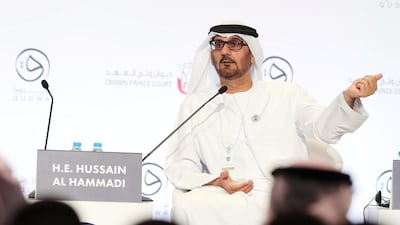Schools and universities need to better prepare young people for the realities of the global job market or risk them being left behind, the education minister said.
Hussain Al Hammadi said the ongoing overhaul of government schools is working but that fresh ideas are needed.
He was speaking at the annual Qudwa forum in Abu Dhabi, which brought more than 900 teachers together on Sunday to share new methods and techniques.
The theme of the event – ‘teaching for global competance’ – calls for an overhaul in teaching methods with values such as problem solving and creativity made the priority rather than memorising facts or passing exams.
“The UAE relies on natural resources and oil but we want to shift to the knowledge-based economy - which means a pilot from the UAE can compete for a job in the UAE, the United States or the United Kingdom," he told an audience at the Manarat Al Saadiyat exhibition complex.
"We want to establish a new generation capable of competition. We need new approaches and new schools. The speed of implementation must be very high, otherwise we will not be able to stay abreast of the latest developments worldwide."
He said government schools in particular have undergone improvements to offer subjects involving design, innovation and architecture to "keep pace with the future of UAE". Subjects related to ethics and social communication will be introduced soon.
"We must establish our own education system because we have a strategy and objectives we need to achieve," he said.
At the event, senior education officials acknowledged “complaints” within the profession about the rapid pace of change, with a string of new policies rolled out over recent years.
There has been a renewed push to interest public school pupils in science and more subjects are taught in English to prepare them for university degrees, where classes are all in English.

“We are living in a changing world and we need to stay abreast of these changes,” said Mohamed Khalifa Al Nuaimi, director of the education affairs office at the Crown Prince Court of Abu Dhabi, which organises the event.
“If we remain committed to an old or outdated methodology, it will be useless.
“Many people are complaining about rapid changes… but this requires strong and bold steps in the field of education so we can keep pace with this change and let our students be able to face unknown challenges."
Experts backed the UAE’s approach, saying the country is well-placed to equip children for the challenges for the future.
Andreas Schleicher, director for education and skills at the Organisation for Economic Cooperation and Development, warned many topics that are easiest to teach and test in exams are also the easiest to digitise - potentially making the skills useless, he said.
“Education is no longer about teaching children just something. It’s about giving them a reliable compass, navigation tools so people can find their own way in this increasingly complex and global world," he said.
“Global competency is about building curiosity, opening minds. It’s about building compassion and opening hearts. It’s also our best weapon against the biggest threats of our time – ignorance, close mindedness, extremism and fear. It’s the tool of our times.
“Small, outward looking countries are very strong at this and I do think the UAE, in the future, is very well positioned."
Dr Amna Al Shamsi, assistant undersecretary at the Ministry of Education said: "We are in a continuously changing world and if we work within an educational framework that has been there for 20 years with no changes, it is not going to fulfill the requirements of the future generation.
"We are trying to create a global citizen with a strong national identity."
The conference is supported by the Ministry of Education, the Abu Dhabi Department of Education and Knowledge, the Knowledge and Human Development Authority of Dubai, and the Organisation for Economic Co-operation and Development.

